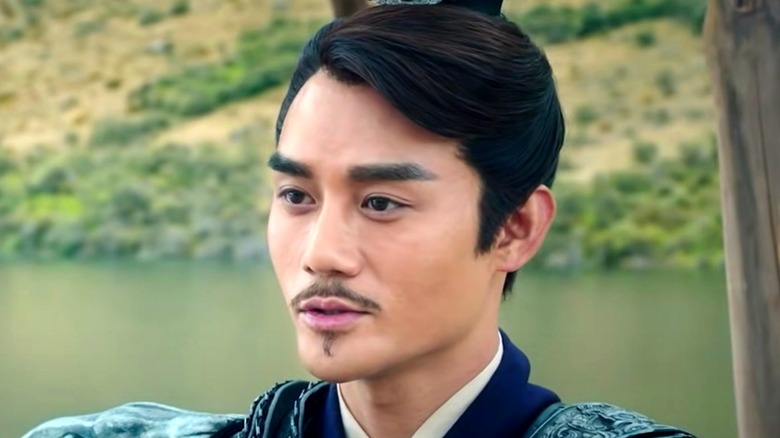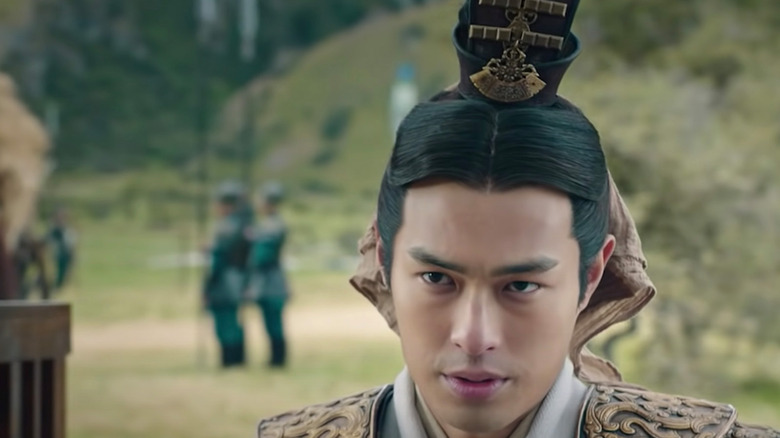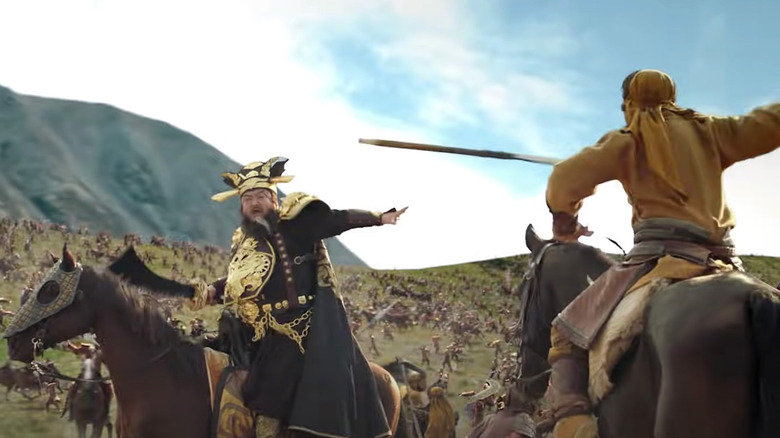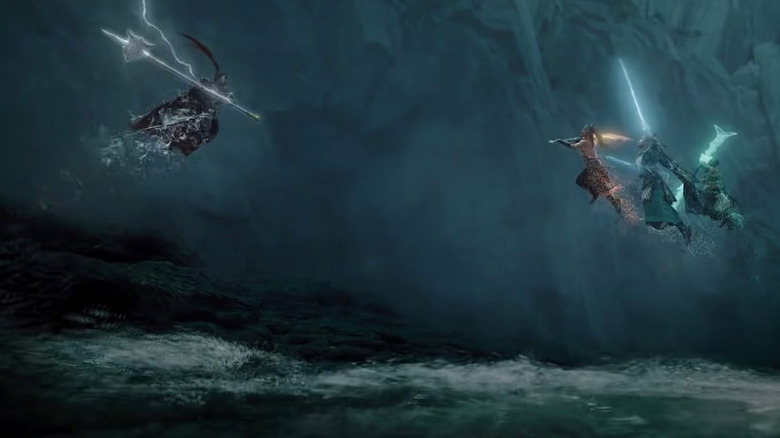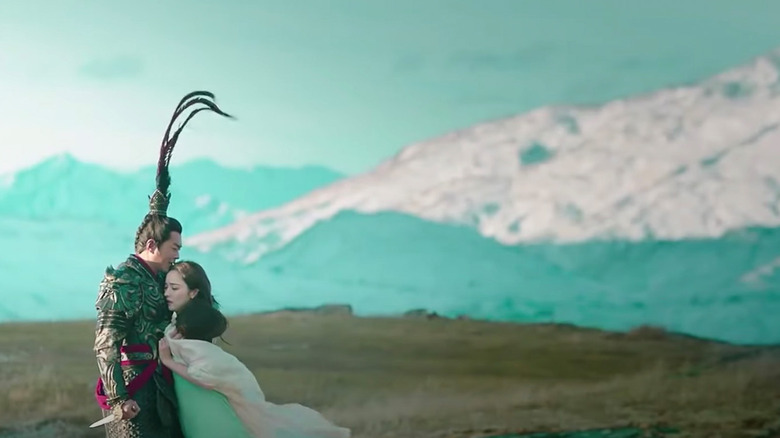What You Need To Know Before Watching Netflix's Dynasty Warriors
In the 21st century, it's become commonplace for American films to perform well in China. Often, American blockbusters like "Avengers: Endgame" are just as successful in China as they were stateside, via The Atlas. And sometimes, the Chinese market rescues an American film from economic oblivion, as it did for everything from "Pacific Rim" to "Transformers 4."
It's much rarer for things to work the other way around. While there have occasionally been Chinese-language films that have succeeded in the U.S. — "Crouching Tiger, Hidden Dragon" grossed $128 million U.S., for example (via Box Office Mojo) — they're the exception to the rule.
But the 2021 martial arts/historical fantasy film "Dynasty Warriors" might help to reverse that trend. It's already based on one of the most popular video game series of all time, and it's already had a successful premiere in China. Here's everything you need to know about "Dynasty Warriors" ahead of its U.S. premiere.
It's coming to Netflix in the U.S. in July
If you're reading this in the United States, you won't have to wait long to check out "Dynasty Warriors" as it premieres on Netflix today, July 1, 2021 (via What's On Netflix).
"Dynasty Warriors" first premiered in Hong Kong on April 29, and then premiered in mainland China the day after, according to Coming Soon. It premiered during China's competitive Labor Day weekend — the holiday fell on May 1 this year — going up against four other films released on the 29th, as noted by Variety.
"Dynasty Warriors" did win its opening weekend in Hong Kong and remained at the top spot for two weeks there (via Box Office Mojo). But on the mainland, it was a different story, ranking ninth on Chinese Labor Day Weekend (via CN Dorama) and grossing a meager $2.4 million in China, per The Number). By comparison, the top film from that weekend, "My Love," took home about $65.1 million.
It's based on a popular video game series
The next most important thing to know about "Dynasty Warriors" is that it's a video game movie and whether that's a good or a bad thing really depends on your point of view. The "Dynasty Warriors" video game franchise is itself a spin-off of another one, "Romance of the Three Kingdoms," which debuted in 1985. "Romance of the Three Kingdoms" is a long-running strategy game series, but "Dynasty Warriors" is more action and combat-focused.
The first "Dynasty Warriors" game was released in 1997 on PlayStation and was a traditional one-on-one fighting game similar to "Mortal Kombat." "Dynasty Warriors 2" came next in 2000 on PlayStation 2, and it set the template for most of the games that followed. Known as the "Shin Sangokumusō," most of the games since "Dynasty Warriors 2" allow the player to take control of a historical warrior and fight in battles that are likewise based on real-life events. They might not be very historically accurate, but they're definitely fun to play.
The most recent game in the series is "Dynasty Warriors 9," which premiered worldwide in 2018. Altogether, the franchise has sold more than 21 million copies (via Famitsu). It's the most popular series from publisher Koei Tecmo.
The plot of the movie follows a 14th century Chinese novel
Based on the trailer, "Dynasty Warriors" the movie looks and feels like the more recent games in the franchise. But the plot of the movie appears to follow the 14th-century novel, "Romance of the Three Kingdoms." (Which originally inspired the strategy games of the same name that "Dynasty Warriors" is derived from.)
"Romance of the Three Kingdoms," per Britannica, is a sweeping epic thought to be written in the 14th century by the Ming court official Luo Guanzhong. It chronicles the events of the Yellow Turban Rebellion, which took place from 184 to 204 CE, that helped bring an end to the Han Dynasty. The novel covers about a century of history and follows hundreds of characters, but the movie will mostly focus on the Oath of the Peach Garden.
The Oath of the Peach Garden is a pivotal moment in the story. After the Yellow Turban Rebellion begins against the Han Dynasty, three warriors named Liu Bei, Guan Yu, and Zhang Fei made a vow to combine their forces and protect the dynasty from the rebels. This event most likely never happened historically, but the three warriors still became known as the legendary Sworn Brothers, all heroes in Chinese history.
The main characters will be familiar to both gamers and history buffs
Since most American viewers are presumably new to Chinese history, here's a who's who of the main characters.
Liu Bei (Tony Yang) is the hero of the movie, the leader of the three Sworn Brothers. Historically, he goes on to found one of the Three Kingdoms that rises after the fall of the Han Dynasty, the Shu-Han Dynasty. In the games, Liu Bei, Guan Yu (Han Geng), and Zhang Fei (Justin Cheung) are all capable of taking on crowds of enemies single-handedly, and it looks like the movie will be the same.
Cao Cao (Wang Kai) is an ally of the Sworn Brothers, although he's highly ambitious himself. Historically, Cao Cao is considered the greatest general of the Han Dynasty. After the Yellow Turban Rebellion, Cao Cao and the Han emperor established another of the Three Kingdoms, the northern kingdom of Wei.
The leader of the Yellow Turban Rebellion and the overall villain of the movie is the portly warlord Dong Zhuo (Lam Suet). After overthrowing the Han Dynasty, Dong Zhuo establishes a tyrannical government that allows China to dissolve into smaller warring kingdoms. Eventually, one of his own generals assassinates him.
That general is Lu Bu (Louis Koo), the main antagonist of the movie. (Lu Bu is also a major character in the "Record of Ragnarok" anime.) In the games, he's just as capable a warrior as the Sworn Brothers. Historically, Lu Bu murdered Dong Zhuo over a rivalry for the affections of Diao Chan. She's traditionally one of the four great beauties of ancient China, and in the film, she's played by Chinese actress and model Gulnazar.
